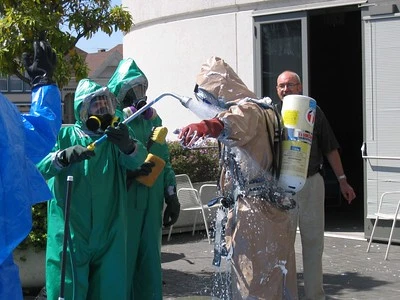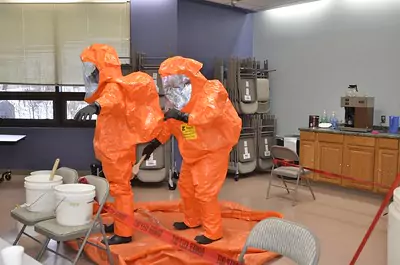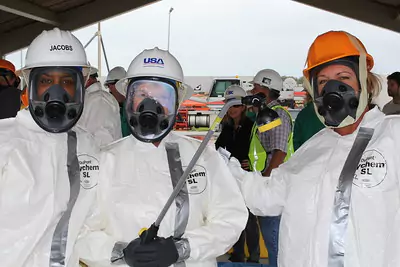Jobs Can You Get With A Hazwoper Certification
November 12, 2023 | by onlineoshasafetytraining.com


Having a HAZWOPER (Hazardous Waste Operations and Emergency Response) certification can open up a variety of job opportunities in industries where handling hazardous materials is a critical component.
The certification is especially relevant for positions that involve dealing with hazardous waste operations, emergency response to hazardous materials incidents, and industrial cleaning of hazardous materials.
Here are some of the jobs you can get with a HAZWOPER certification, including some technical aspects and numbers where relevant:
- Environmental Technician or Specialist
- Responsibilities: Conduct fieldwork to monitor the environment and investigate sources of pollution, including hazardous waste.
- Salary Range: Typically, environmental technicians earn between $30,000 to $70,000 annually, depending on experience and location.
- Hazardous Waste Manager
- Responsibilities: Oversee the treatment, storage, and disposal of hazardous wastes according to federal and state regulations.
- Salary Range: The average salary can range from $50,000 to over $100,000 per year.
- Emergency Response Coordinator
- Responsibilities: Plan and coordinate emergency response strategies for hazardous materials incidents.
- Salary Range: The salary can vary widely but generally ranges from $40,000 to $90,000 annually.
- Industrial Hygienist
- Responsibilities: Identify and mitigate workplace hazards, including hazardous materials, to ensure worker safety.
- Technical Aspect: Often requires knowledge of OSHA standards, which might include permissible exposure limits (PELs) for various substances.
- Salary Range: The median salary is around $70,000 to $100,000 per year.
- Safety Officer
- Responsibilities: Implement and oversee safety protocols in workplaces handling hazardous materials.
- Technical Aspect: Knowledge of Hazard Communication Standard (HCS) and Global Harmonized System (GHS) might be necessary.
- Salary Range: Generally, safety officers earn between $50,000 to $80,000 per year.
- Hazardous Materials Technician
- Responsibilities: Specialized in handling, transportation, and clean-up of hazardous materials.
- Technical Aspect: Must be proficient in using personal protective equipment (PPE) and understanding Material Safety Data Sheets (MSDS).
- Salary Range: Typically earns around $30,000 to $60,000 per year.
- Site Supervisor for Hazardous Waste Cleanup
- Responsibilities: Manage teams during hazardous waste cleanup operations, ensuring compliance with legal and safety standards.
- Salary Range: The salary can vary but is often in the range of $60,000 to $100,000 annually.
- Consultant for Environmental Services
- Responsibilities: Provide expert advice on environmental management and hazardous waste handling.
- Salary Range: Consultants can earn anywhere from $50,000 to over $100,000 per year, depending on expertise and client base.
Other Jobs are:
Environmental Consultant
- Advising on Hazardous Waste Management:
- Technical guidance on proper disposal methods for various types of hazardous waste, adhering to Resource Conservation and Recovery Act (RCRA) regulations.
- Conducting Hazard Analysis and Critical Control Points (HACCP) assessments for businesses.
- Implementation of waste minimization and pollution prevention strategies.
- Regulatory Compliance and Environmental Protection:
- Assisting businesses in complying with the Comprehensive Environmental Response, Compensation, and Liability Act (CERCLA) and other environmental laws.
- Developing Environmental Management Systems (EMS) for organizations to systematically manage their environmental impacts.
Disaster Response Specialist
- Hazardous Material Management During Disasters:
- Rapid assessment and containment of chemical spills following disasters, using spill containment booms and absorbents.
- Deploying emergency response plans for hazardous material incidents, including evacuation protocols and decontamination procedures.
- Collaboration with Agencies and NGOs:
- Working alongside FEMA, EPA, and other government entities during emergency responses.
- Coordination with NGOs for resource allocation and community assistance during disaster recovery phases.
Hazardous Material Transport Manager
- Oversight of Hazardous Material Transportation:
- Ensuring compliance with the Department of Transportation’s (DOT) Hazardous Materials Regulations (HMR) during transport.
- Implementing safety measures such as proper labeling, packaging, and placarding of hazardous materials.
- Regulatory Compliance:
- Maintaining records as per the Hazardous Materials Transportation Act (HMTA).
- Conducting regular audits and risk assessments to ensure regulatory compliance.
Bioremediation Specialist
- Restoring Contaminated Environments:
- Utilizing microorganisms or plants to detoxify environments contaminated with heavy metals, hydrocarbons, or other hazardous substances.
- Designing and implementing bioreactor systems for site-specific bioremediation processes.
- Environmental Restoration Projects:
- Collaborating with environmental agencies for large-scale restoration projects.
- Monitoring and evaluating the effectiveness of bioremediation techniques.
Emergency Planning and Community Right-to-Know Act (EPCRA) Specialist
- Implementing EPCRA Regulations:
- Assisting facilities in reporting hazardous chemical inventories under the EPCRA Tier II reporting requirements.
- Developing emergency response plans as per Local Emergency Planning Committee (LEPC) guidelines.
- Collaboration for Hazardous Material Awareness:
- Conducting community outreach programs to educate the public about hazardous material risks and safety measures.
- Coordinating with local governments for emergency preparedness drills and training sessions.
Forensic Environmental Investigator
- Investigating Environmental Crimes and Hazards:
- Collecting and analyzing samples from contaminated sites for evidence of environmental violations.
- Utilizing Geographic Information Systems (GIS) for mapping and analyzing environmental crime scenes.
- Collaborating with Law Enforcement and Legal Entities:
- Providing expert testimony in legal cases involving environmental violations.
- Working closely with environmental law enforcement agencies for case investigations.
Underwater Hazardous Material Handler
- Challenges in Aquatic Hazardous Material Handling:
- Implementing containment and recovery techniques for underwater spills, considering factors like water currents and marine ecology.
- Utilizing remote-operated vehicles (ROVs) and specialized diving equipment for hazardous material recovery.
- Marine Conservation and Oil Spill Responses:
- Participating in oil spill response teams for containment and cleanup operations.
- Assessing and mitigating the impact of hazardous materials on marine life and ecosystems.
In all these roles, the HAZWOPER certification is valued because it demonstrates a thorough understanding of safety practices, legal compliance, and emergency response procedures related to hazardous materials. The certification typically requires completing a 40-hour training course for general site workers or a 24-hour course for occasional site workers, along with annual 8-hour refresher courses.
Read related article: How Much Does Hazwoper Training Cost
Entry Level Hazwoper Jobs
Entry-level HAZWOPER jobs typically involve working in environments where exposure to hazardous substances is a significant risk. These roles require adherence to OSHA’s standards, which are outlined in 29 CFR 1910.120. Some entry level jobs are:
- Air Monitoring Technician
- Water Treatment System Operator
- Chemical Technician
- Environmental Field Technician
- Hazardous Waste Handler
- Emergency Response Team Member
- Environmental Health and Safety Assistant
- Hazardous Materials Technician
In these roles, employees are expected to have a fundamental understanding of various hazardous materials and their associated risks. They should be proficient in using personal protective equipment (PPE), such as respirators (with specific OSHA Assigned Protection Factors), chemical protective clothing (compliant with ASTM F1001 standard test chemicals), and other safety gear.
Duties often include:
- Hazard Identification: Recognizing and evaluating potential hazards in the workplace. This could involve measuring concentrations of hazardous substances using devices like photoionization detectors (PIDs) for volatile organic compounds (VOCs) and using NIOSH or OSHA sampling methods.
- Site Characterization and Analysis: Conducting preliminary surveys of sites to determine the presence of hazardous materials. This can involve soil sampling, using gas chromatography-mass spectrometry (GC-MS) for analysis, and understanding the Threshold Limit Values (TLV) for various chemicals.
- Decontamination Procedures: Understanding and applying proper decontamination techniques. This includes knowledge of decontamination zones (Exclusion, Contamination Reduction, and Support Zones) and the use of decontamination equipment like wash tanks and showers.
- Emergency Response: Participating in emergency response activities for hazardous substance releases. This involves understanding Incident Command System (ICS) protocols and the use of spill containment methods like dikes, absorbents, and neutralizing agents.
- Health and Safety Plans (HASP): Assisting in the development and implementation of site-specific health and safety plans.
- Regulatory Compliance: Ensuring compliance with federal and state environmental regulations, including proper labeling, storage, and disposal of hazardous materials.
Entry-level workers are usually required to complete a 40-hour HAZWOPER training program, which covers topics like toxicology, chemical hazards, risk assessment, and emergency procedures. Continuous education and on-the-job training are crucial for maintaining safety and compliance in these roles.
Industries for HAZWOPER Certified Professionals
- Hazardous Waste Management
- This is a primary area where HAZWOPER certification is crucial. Professionals in this industry deal with the treatment, storage, and disposal of hazardous waste. Their work is vital for maintaining environmental safety and compliance with government regulations.
- Environmental Services
- Environmental service companies, which often engage in cleaning up contaminated sites and conducting environmental assessments, highly value HAZWOPER certification. Professionals in this field work to minimize pollution and manage environmental hazards.
- Emergency Response and Disaster Recovery
- In emergency response services, HAZWOPER certification is essential for those responding to incidents involving hazardous materials. This includes oil spills, chemical plant accidents, and natural disasters with environmental impacts.
- Industrial and Manufacturing Sectors
- Industries that handle hazardous materials in their manufacturing processes, like chemical, pharmaceutical, and petroleum industries, require employees with HAZWOPER certification for safe operations and compliance.
- Construction and Demolition
- In construction, particularly in projects involving the rehabilitation of contaminated sites or demolition of structures with hazardous materials, HAZWOPER-certified professionals are needed to ensure safety and regulatory adherence.
- Government Agencies and Public Sector
- Various government bodies, especially those related to environmental protection, public health, and occupational safety, employ HAZWOPER certified professionals for regulatory enforcement, public safety, and policy development related to hazardous materials.
- Research and Development
- In research facilities, especially those dealing with hazardous chemicals and materials, HAZWOPER certification is valuable for ensuring safe handling, disposal, and experimentation protocols.
- Transportation and Logistics
- The transportation sector, including companies that specialize in moving hazardous materials, requires HAZWOPER-certified professionals to manage risks associated with the transport and storage of these materials.
Read related article: Is Online Hazwoper Training Acceptable for Refresher Training?
Specific Job Roles and Responsibilities for Certified Professionals
| Job Role | Primary Responsibilities | Typical Salary Range (Annually) |
|---|---|---|
| Environmental Technician | – Conduct environmental sampling and monitoring. – Assist in cleanup of contaminated areas. |
$30,000 – $70,000 |
| Hazardous Waste Manager | – Oversee hazardous waste storage, treatment, and disposal. – Ensure compliance with regulations. |
$50,000 – $100,000+ |
| Emergency Response Coordinator | – Lead response to hazardous materials incidents. – Coordinate emergency strategies and training. |
$40,000 – $90,000 |
| Industrial Hygienist | – Identify and mitigate workplace hazards. – Develop safety programs and advise on health standards. |
$70,000 – $100,000 |
| Safety Officer | – Implement safety standards. – Conduct safety audits and investigate accidents. |
$50,000 – $80,000 |
| Hazardous Materials Technician | – Handle and cleanup hazardous materials. – Participate in emergency response teams. |
$30,000 – $60,000 |
| Site Supervisor (Hazardous Waste) | – Manage hazardous waste cleanup operations. – Supervise cleanup crews and coordinate with agencies. |
$60,000 – $100,000 |
| Consultant (Environmental Services) | – Provide advice on environmental management. – Perform assessments and assist in remediation efforts. |
$50,000 – $100,000+ |
| Environmental Compliance Specialist | – Ensure organizational adherence to environmental regulations. – Conduct audits and prepare documentation. |
$40,000 – $85,000 |
| Research Technician (Environmental) | – Support environmental research projects. – Manage hazardous materials in research settings. |
$35,000 – $65,000 |
These salary ranges are approximations and can vary based on factors like experience, location, and the specific employer. Additionally, the responsibilities listed are general and can differ or expand depending on the specific role and organization.
Technical Skills and Knowledge Required for HAZWOPER Certified Jobs
- Understanding of Hazardous Materials
- Knowledge about different types of hazardous materials, their properties, and how they can impact health and the environment.
- Familiarity with the handling, storage, and disposal procedures for various hazardous substances.
- Safety Procedures and Compliance
- Proficiency in implementing safety procedures to minimize risks associated with hazardous materials.
- Understanding of compliance requirements under OSHA (Occupational Safety and Health Administration) guidelines, specifically relating to hazardous waste operations.
- Emergency Response and Containment
- Skills in emergency response planning and execution, including spill containment and decontamination procedures.
- Ability to assess emergency situations involving hazardous materials and implement effective response strategies.
- Use of Personal Protective Equipment (PPE)
- Knowledge of various types of PPE, such as respirators, gloves, and protective clothing, and when each type is appropriate.
- Skills in properly using, maintaining, and inspecting PPE to ensure safety and compliance.
- Health and Environmental Risk Assessment
- Ability to conduct risk assessments to identify potential health and environmental hazards in work involving hazardous materials.
- Skills in developing and implementing risk mitigation strategies.
- Waste Management and Disposal
- Expertise in hazardous waste management, including waste characterization, segregation, and disposal methods.
- Familiarity with legal requirements for hazardous waste disposal and transportation.
- Record-Keeping and Documentation
- Skills in maintaining accurate records of hazardous materials handling, waste disposal, and incident response.
- Understanding of the importance of documentation for regulatory compliance and auditing purposes.
- Incident Command System and Team Coordination
- Knowledge of the Incident Command System (ICS) for coordinating effective responses to hazardous materials incidents.
- Ability to work collaboratively in a team and communicate effectively during high-pressure situations.
- Decontamination Procedures
- Understanding of various decontamination procedures and the ability to implement them effectively.
- Knowledge of decontamination zones and the use of decontamination equipment.
- Training and Education Skills
- Ability to train others in HAZWOPER procedures and safety measures.
- Continuous learning and staying updated with the latest practices and regulations in hazardous waste operations.
These skills and knowledge areas are typically covered in HAZWOPER certification training, equipping professionals to handle hazardous materials safely and effectively in various work environments.
Read related article: Can I Take Hazwoper Training if I’m Not Currently Employed?
Career Advancement Opportunities with HAZWOPER Certification
- Broader Job Opportunities: HAZWOPER certification opens doors to a variety of roles in environmental services, hazardous waste management, and emergency response.
- Leadership Roles: Experienced professionals can progress to supervisory or managerial positions, such as site supervisors or safety directors, offering increased responsibility and higher pay.
- Specialization Paths: There are opportunities to specialize in areas like emergency response or industrial hygiene, leading to roles as consultants or experts in these niches.
- Cross-Industry Flexibility: The certification allows for movement between different sectors, such as manufacturing, government, and consulting, enhancing career flexibility.
- Educational Roles: Seasoned professionals can transition to training and educational roles, teaching others about safe hazardous waste operations and emergency response.
- Higher Earning Potential: Advancement in career often leads to increased salaries and benefits, especially in higher-level positions.
- Networking and Industry Recognition: Working in HAZWOPER roles often involves networking with a range of professionals and organizations, leading to greater industry recognition and career growth opportunities.
- Influencing Policies: With experience, professionals can contribute to policy development and serve as advisors on hazardous materials and workplace safety, impacting industry standards.
These points illustrate how HAZWOPER certification can be a stepping stone to various career advancements, offering a trajectory for professional growth in fields dealing with hazardous materials and safety.
Job Outlook for Hazwoper Professionals
The future outlook for professionals appears to be positive and evolving. The significance of HAZWOPER certification in hazardous waste operations and emergency response is increasingly recognized across various industries, especially given the ever-changing workplace environments and the critical need for safety in handling hazardous materials.
The demand for certified professionals is strong, and the Bureau of Labor Statistics expects HAZMAT-related jobs to grow by 10% per year through 2026. Salaries for professionals can range widely, from $20-100 per hour, or $38,000 to $192,000 per year, depending on the specific role and level of expertise. For example, HAZMAT Containment and Disposal Managers can earn between $70,000 and $144,000 annually, while HAZMAT Transporters can earn salaries ranging between $88,000 to $130,000 due to strong industry demand.
HAZWOPER training and certification provide a broad array of benefits, enhancing workplace safety, fostering professional growth among employees, and ensuring compliance with OSHA regulations. This training is essential for a wide range of roles, including HAZMAT Removers, Transporters, Coordinators, Training Specialists, Fire Fighters, Emergency Responders, Police Officers, DEA Agents, and Agricultural Workers, among others.
The certification not only equips professionals with the necessary skills and knowledge for hazardous situations but also makes them valuable assets to their organizations by contributing to a safety-conscious culture. Moreover, the critical thinking and problem-solving skills imparted by HAZWOPER training are applicable across various professional scenarios.
Therefore, professionals with certification are well-positioned for a range of opportunities in different sectors, including hazardous waste management, environmental services, emergency response, and various industrial roles. This certification is a worthwhile investment for those looking to enhance their skills or for companies aiming to maintain the highest safety standards.
Conclusion
Obtaining a HAZWOPER certification is not merely about meeting a regulatory requirement; it’s a gateway to a multitude of rewarding career opportunities in various high-demand industries. From environmental technicians and hazardous waste managers to emergency response coordinators and safety officers, the certification opens doors to diverse roles that are crucial in maintaining workplace safety and environmental integrity.
With the growing emphasis on environmental protection and safety, the need for skilled professionals in handling hazardous materials is more significant than ever. A HAZWOPER certification not only enhances employability but also paves the way for career advancement, offering paths to leadership, specialization, and even roles in education and policy development.
For those considering a career in industries that deal with hazardous materials, or for those looking to expand their professional horizons, HAZWOPER certification represents a valuable investment. It equips individuals with the necessary skills and knowledge to perform effectively and safely in a variety of challenging yet fulfilling roles, making a meaningful contribution to their organizations and society at large.
RELATED POSTS
View all


